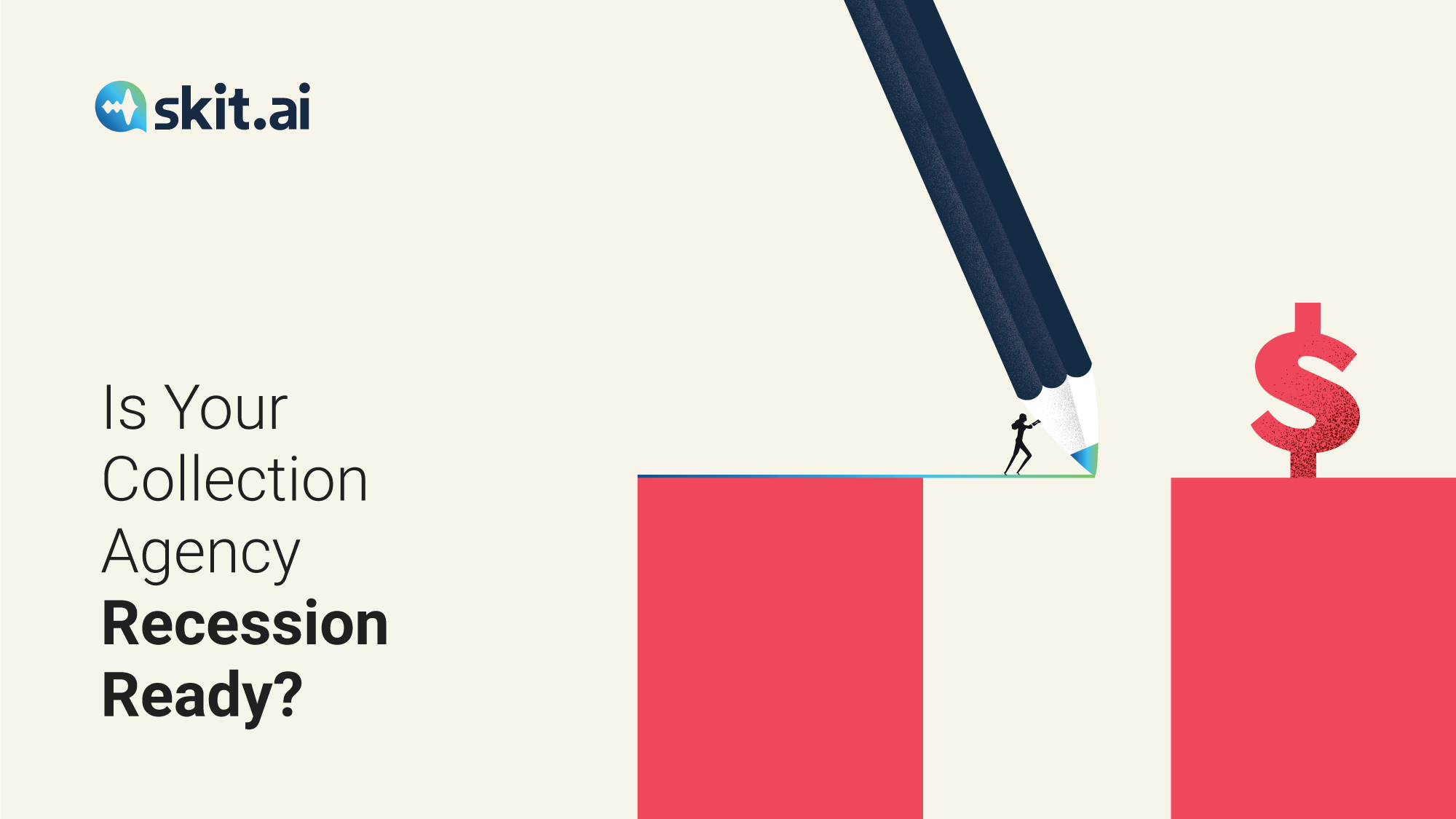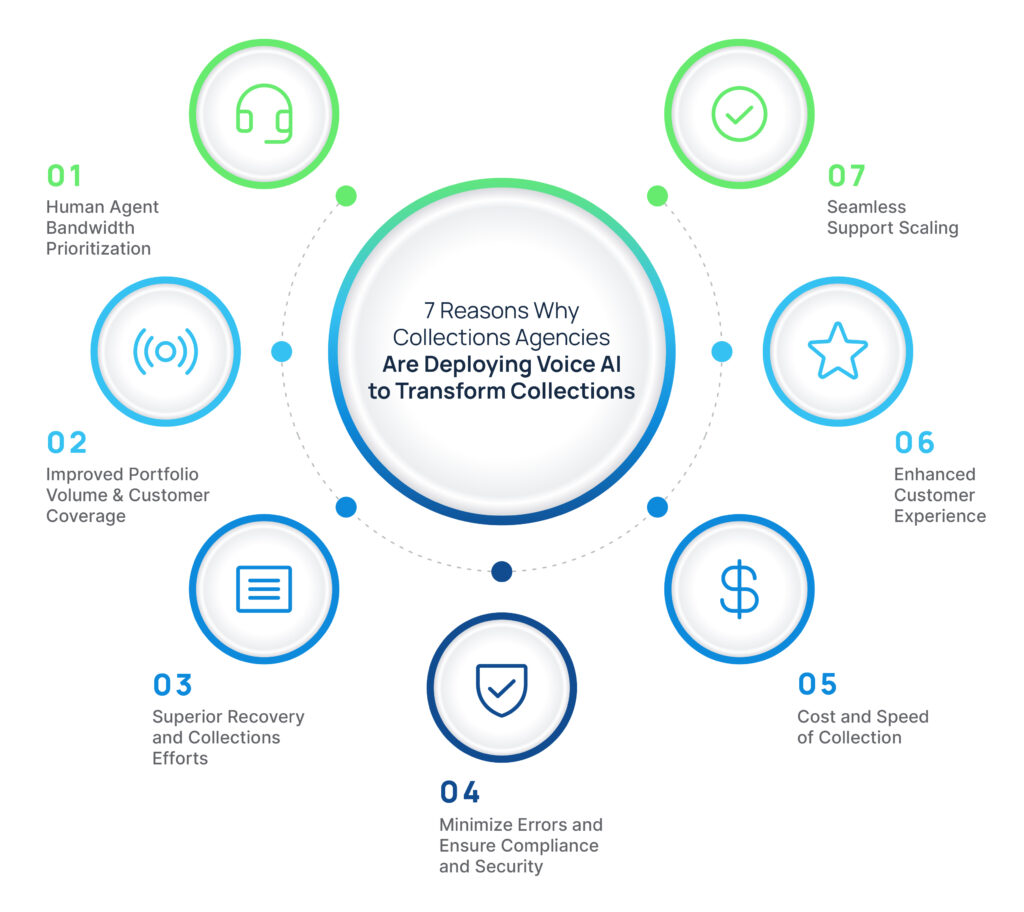Simone Somekh
September 21, 2022

Hello! Welcome to Skit.ai. Click here to book a demo.
September 21, 2022

The U.S. economy has been shrinking, with many experts already pointing out that technically we have already entered a recession, as the economy has now contracted for two consecutive quarters. Fears of a recession have dominated most sectors of the economy over the last few months, and the ARM (Accounts Receivable Management) industry is no different.
The economy is slowing, inflation is high, and the Federal Reserve has been increasing its interest rates, and yet the data suggest that we find ourselves in a more complex and nuanced situation. Unemployment is still very low and the economy has been adding hundreds of thousands of new jobs each month, suggesting that it’s not all doom and gloom.
The latest reports, however, predict there will be a “mild recession” between 2022 and early 2023, with inflation being a major indicator of the direction the economy is headed towards, according to authoritative institutions such as Bank of America and Wells Fargo.
How can debt collection agencies prepare for a recession, and what do we know from previous economic crises that can guide us through the uncertain period ahead of us?
Times of economic uncertainty are a mixed bag for collection agencies.
During a recession, the consumers who have the ability to be more conservative with their spending habits may choose to be more careful than usual. This might result in less borrowing. However, accounts might start increasing significantly as soon as the economy recovers.
On the other hand, for the people who already owe money, it might be more difficult to pay off their balances with jobs and income in jeopardy—leading to more defaults.
Additionally, the agency itself might need to take measures to cut down on costs. This may result in a reduction in staff, which will directly affect collection rates.
Data gathered by the advisory firm Kaulkin Ginsberg shows how the ARM industry reacted to the last two major economic crises in the United States.
During the Internet bubble bursting — also known as the Dotcom crash — the ARM industry experienced a boom, with its revenue increasing from $8.2 billion in 2000 to $9.3 billion in 2001—a 13.4% increase. Between 2002 and 2005, the industry experienced continued growth at a similar rate.
The Great Recession of 2008, however, put the ARM industry to the test. The revenue fell by 14.4% from 2007 to 2009. Debt collection agencies struggled to collect payments, as consumers did not have the ability to pay off their debts. Many lenders scaled back their operations, leading to less accounts for collectors to manage.
And yet, just like in the previous crash, the years following the Great Recession were pretty good for the industry. While growth rates did not resemble the pre-recession boom, the industry still grew at an average rate of 4.16% per year.
Optimize All Processes
To make your organization recession-proof, the first step is to optimize all of your internal processes and workflows. Analyze the existing processes and the customer journey and ask yourself: Can you identify any pain points? Where are resources missing and where are they abounding? Are there any workflows that can be shortened or reshuffled? Are there any tech tools to add to your stack that can help with any of the issues you’ve identified?
Invest in Agent Retention
Agent attrition in collection agencies is very high, and this creates additional expenses, as agencies need to cover recruiting, hiring, and training costs each time an agent leaves their job. Investing in agent retention is a must for agencies preparing for a recession. You want to keep your agents happy and make sure they don’t feel overly stressed or overwhelmed with calls. Consider adopting tech solutions that could take over some of the most repetitive and tedious agent workload.
Prepare for Account Volume Fluctuations
As account volume gets more volatile, agencies may experience more fluctuations in volume of outbound calls, needing more or less resources depending on the time. Agencies should develop a strong plan to address these scenarios; plan ahead even if you might not be experiencing this issue yet.
Offer Plenty of Payment Options
Once a customer is ready to pay, you should make it as easy as possible for them to pay using the method they prefer, including mobile payment apps. Collection agencies have started adopting PayPal and Venmo as payment methods, and the first data suggests that adoption is very successful.
The majority of Americans (79%) use mobile payment apps, according to a survey by NerdWallet. When looking specifically at the younger generations, the numbers go up: 94% of millennials use mobile payment apps.
Invest in Customer Self-Service
The existing data on customer service and customer experience indicates that customers expect companies to offer self-service customer care options. 39% of U.S. consumers find it very important to have access to a fully self-serve customer care option available to resolve their issues, according to a report by Emplify.
Self-service for a collection agency includes the ability to easily make payments and solve smaller issues by using the agency’s website, a mobile application, or an AI-powered Digital Voice Agent. More on that in the next section!
Looking ahead and adopting technological solutions that can help you automate processes and improve the customer and employee experiences is one of the best ways to future-proof your collection agency, especially as we prepare for a likely recession.
Voice AI — AI-powered Digital Voice Agents to perform your outbound calls and collect payments from your customers — is becoming more and more popular and common among collection agencies in the United States.
In a recession, you not only want to save money, but you also want to ensure you maintain a competitive edge over your competitors. Looking into the adoption of artificial intelligence technologies that can automate your operations is key to securing a competitive advantage.
The benefits of Voice AI for collections include:

For more information and a free demo, you can schedule a call with one of our collections experts. We’ll be happy to help!
The auto finance industry is experiencing significant transformations driven by market dynamics, consumer behavior, and technological innovations. Here are the key trends shaping the future of auto finance, focusing on the implications for Buy Here Pay Here (BHPH) dealers and the role of Conversational AI and contact center automation in streamlining operations, which will help […]
The auto finance industry, a crucial pillar in the automotive market, experienced a turbulent Q2 in 2024. The rise of delinquent accounts in subprime lending has become a significant concern for industry stakeholders. Subprime lending, which targets borrowers with lower credit scores, is inherently riskier, and recent economic pressures have worsened these risks. This blog […]